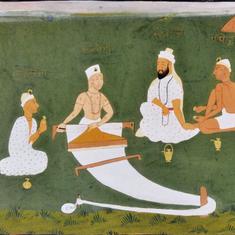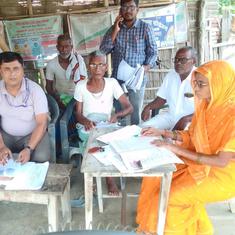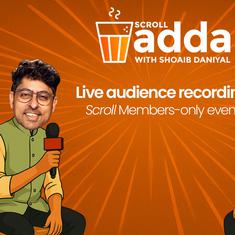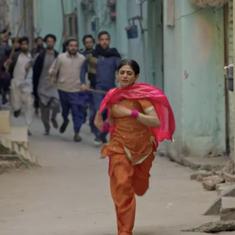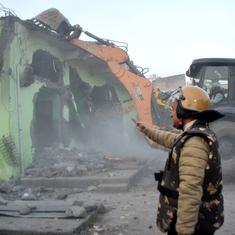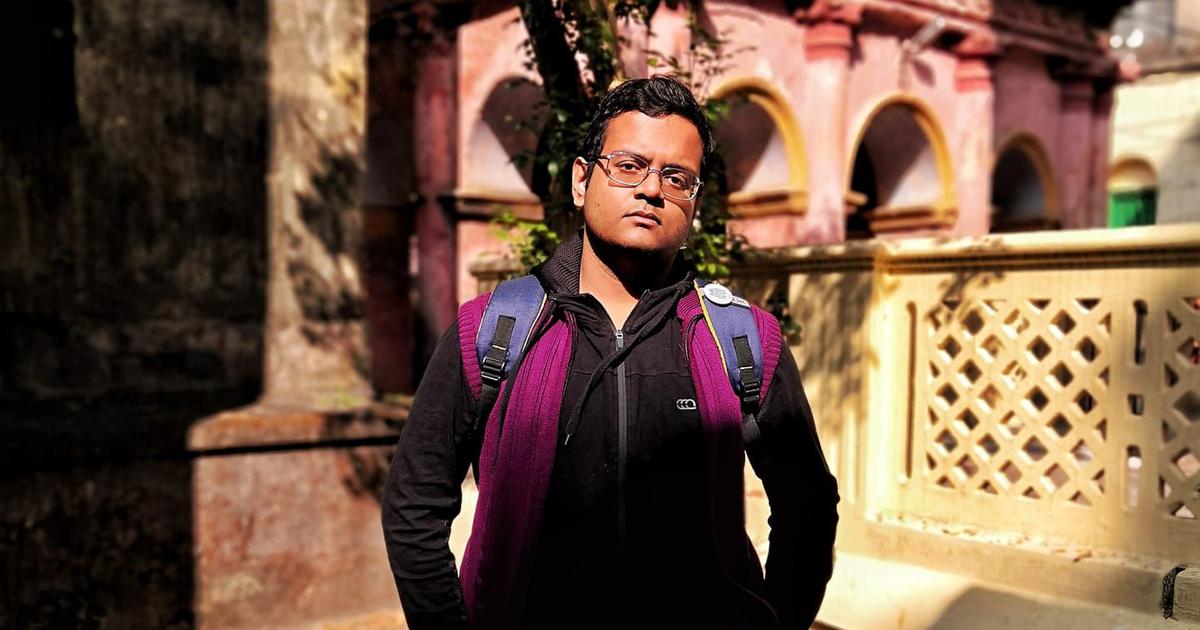I sit uncomfortably on the chair in a behemoth room. Lights like neon rain flood the walls and the furniture beneath them. It speaks of riches beyond my grasp. The place looks like a private aristocratic hotel, rather than like a government office. I moisten my lips and wait for my turn. Many share the room with me – girls and boys of my age – all tensed and agitated. From time to time, the receptionist echoes a number through his monotone voice, “L21, please report to chamber eight.”
I glance at a small printed paper, my token. My sweat fades the letters. “How long will it take to call M14?” I mutter. Though I am not a person accustomed to waiting, now I do not want my session to start.
The small, spherical lights hanging from the false ceiling resemble a starry night. I stare at them, and they take me back to that place near the Radcliffe Line where I was born. Maybe, the skies are like that: beautiful, transient – like a passionate one-night stand lover. They bring back memories until they fade away like mists of a late-winter morning. I wish my memories were more like the smog that engulfs this city in its persistent choking embrace at this time of the year. But parts of my memories are like pieces of fabric, loosely hanging in the balance by delicate strings of unwoven threads. Most of them are gone, or lost so deep within me that I fail to uncover them. The attempts result in seizures. But what flashes between the seizures creates conflict with the “history lessons” I was taught in school, with the chapter on the Cleansing that began before my time. It started in India’s east and northeast frontiers more than two decades ago, just when the tapered Meghna basin of Bangladesh began to sink under the ocean’s rising hungry tides. I barely recall the shadowy nights I spent looking at the stars, the only sky available for us in that place. Until my mother jumped in the Ichamati and the river’s cold, dark green water brought me to India, I didn’t know what the sky was like.
I now know the sky is a dome; it’s a prison.
“M14… M14, please report to chamber two.” The receptionist’s voice brings me back. How long was I spaced out? I quickly fumble my unkempt hair, wipe the drool off my lips, and clear my voice before standing near the chamber’s door. “Please place your hand on the plate,” an electronic voice says.
I do, and a minuscule needle pierces my thumb and draws a drop of blood. Ouch! The blood quickly saturates a piece of fibre that weirdly looks like a crossbreed of circuit dye and a checkerboard – a Heritage Scanner. The voice again states, “Thank you for your cooperation. You are fifty-seven per cent Arya; you may now enter.”
What would have happened if I were not? I know about the Citizenship Act and how it is making a new Aryavarta in the eyes of our Neta, the great leader. If this were Germany of the 1940s, I would have called him the Führer. Instead, I gulp that thought and step in. They want me to register because I am one of the new millions reaching adulthood. I have to register because I want to remember my mother’s face for one time, at whatever cost.
A man with brilliant eyes enters the room with opaque glass walls. He has broad shoulders and a square jawbone. His eyes are almond brown, and his hair is grey with age. He is nearly a Class-One in the National Citizen Register. As far as I know, I am a Three/Four.
“Ah,” he says, “Miss Shakuntala Bose, এখাানে আসাার জন্যয ধন্যযবাাদ…” He swiftly changes from my soothing mother tongue to the state’s second official language: “I hope you are familiar with the procedures, as you have already signed the NDA form.”
Involuntarily, asshole.
“As my Bengali is a bit off and the bot recording this session faces a hard time translating it into English, I guess we both are bound to use the language of our old colonial masters. I hope you are okay with it. ঠিক আছে তো?”
“Yes,” I nod.
“Good. From the data I have on my screen, I see you are a member of the Kshatriya Varna, and you are fifty-seven per cent of pure descent. I know in the past, our forefathers did not put any restrictions on inter-caste coitus. Still, if you can shed any light on the origin of the impurities in your blood, it will be highly appreciated.” He has rehearsed his lines well.
“No.” I nod again. Differently. A blurry image of someone I vaguely identify as my mother flashes before my eyes. “I don’t know.”
“Thank you. But before we start, let me ask again: are you acquainted with what we do here?”
The person who found me crying in my mother’s cold hands on the muddy bank of the Ichamati, Dr. Nirmalya Bose, is one of the last generations of liberals. He put me in a good school and taught me the secular ways of life. I was the only girl in the whole class. I learned a lot about the world that had ceased to exist before I was born. For a brief moment in human history, we created a paradise before it descended to purgatory. I finally occupy the operating couch in the chamber and sit with my spine erect. “According to Article 5A, 51B, any person born after 26 November 2024, either or both of whose parents or grandparents are a lawfully registered or by-birth citizen of Bharat, shall perform as a fundamental duty to the state by enlisting his or her biometric, genetic and anatomical credentials for the betterment of the state and its people as a reference to create, amend and moderate the binding list of citizens thereof.” I enjoy the gradual widening of his eyes.
“Ah… you are very well-versed.”
“But I don’t know the procedure, doctor. Please let me understand that. I hope I have cleared any doubts you were facing.”
“Yes, I’m not accustomed to someone so… erudite.”
“By someone, you do mean a girl.”
“Yes.” His face reddens. He shakes his head and points to the helmet at the head of the couch. “When the government removed the right to education of women from the fundamental rights list, many girls left schools. The parents felt that it was a necessary reaction…”
“And yet, you, a government employee, find that hard to agree with.”
“Doesn’t matter. I’m here to perform a simple surgery on your brain. That and that only.” He takes a vial containing a glimmering grey liquid from an adjoining tray. “These are neuronal nanobots. They search for some special proteins found in our brain’s hippocampus, neocortex, and amygdala. I’m going to inject this inside you – so that we can see and then cleave out any unnecessary episodic memory.”
To create a state where no dissent is expressed.
I try to remember those three names in the back of my head and fail. They were not a part of my discipline. “Okay.” I lay down on the couch, thinking of how necessary the whole thing is for me. In a state where even breathable air is up for sale in those online markets, this is the only supposedly free thing. “Free is an ambiguous concept to provoke discernment,” Nirmalya often said. A thing made accessible by the state is a thing prepaid by its citizens.
“Ms Bose, you may feel a slight pinch,” the doctor says. He injects the vial into my neck. “The nanobots will find any area lighting up with the questions I’m going to ask you and extricate memories and limit that area’s neuronal actions, if necessary.” He puts the helmet over my head and starts to assemble the parts to connect it to the mainframe.
“Am I going to be a vegetable after this?” I ask, seeing the complex mechanism. Sweats immediately form on my forehead.
“No. God! No.” For the first time, I watch a smile cracking on his face, a genuine one. “India… Bharat has performed around a billion surgeries like this over the past ten years. Let me assure you, no such thing will happen. You are as safe as a rock on the ocean floor. You will remember only the events you are suitable for.”
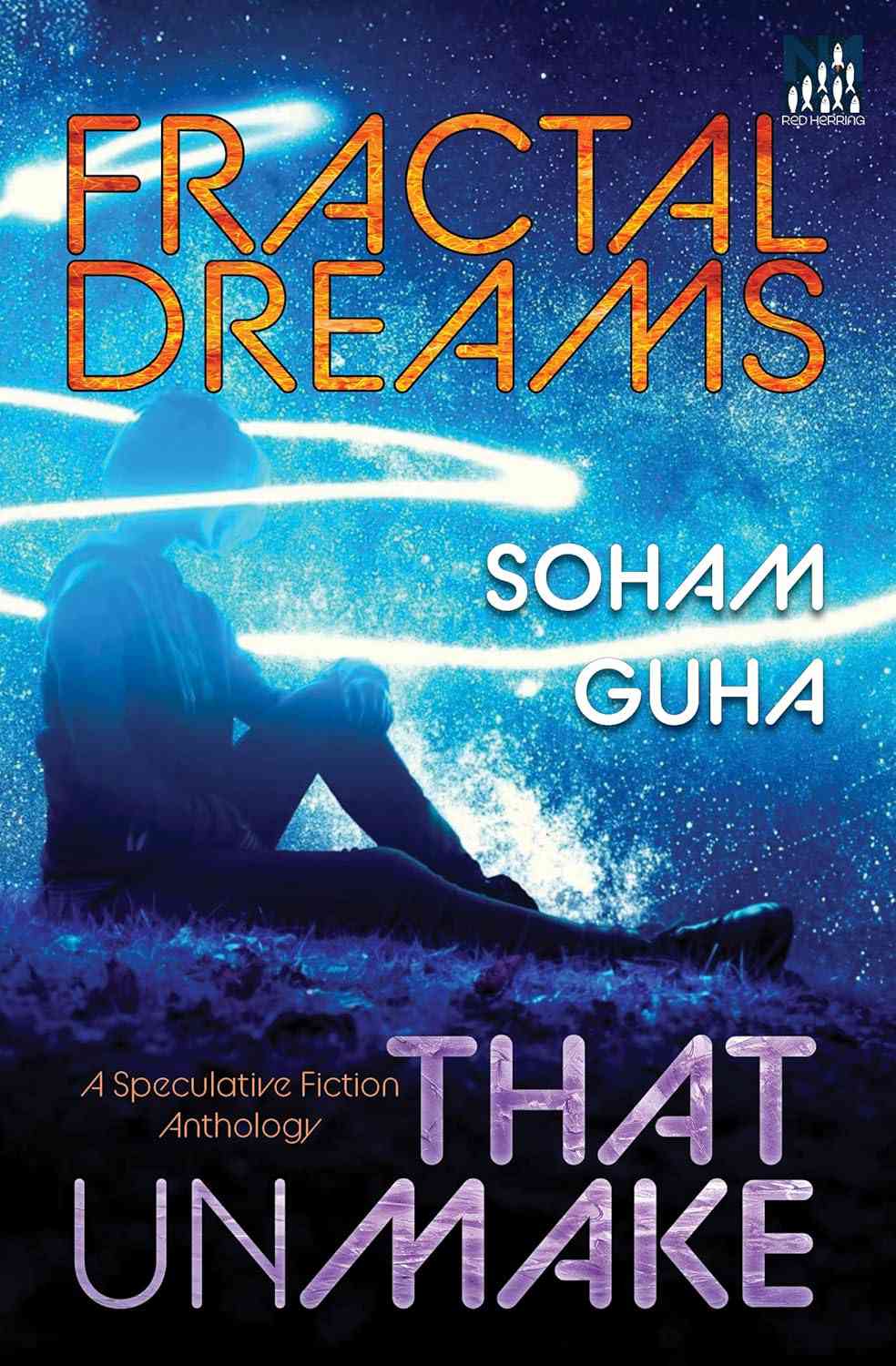
Excerpted with permission from ‘Children Between Lines’ in Fractal Dreams That Unmake, Soham Guha, translated from the Bengali by Sarban Bandyopadhyay, The Antonym Collections.


